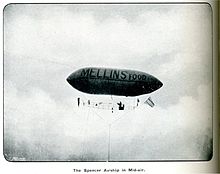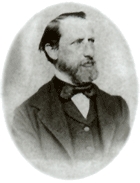
Mellin's Food Works was a maker of Mellin's Food for Infants and Invalids in London, England. [1]
Contents
Mellin's Food Company (Doliber-Goodale Company) was a maker of Mellin's Food for Infants and Invalids in Boston, Massachusetts.

Mellin's Food Works was a maker of Mellin's Food for Infants and Invalids in London, England. [1]
Mellin's Food Company (Doliber-Goodale Company) was a maker of Mellin's Food for Infants and Invalids in Boston, Massachusetts.
The company started when the English food chemist Gustav Mellin developed an infant formula in 1866. [2] Mellin's formula was a simplified version of one which had been recently invented by the German chemist Justus von Liebig. [3] It wasn't a total nutritional supplement; the powder was diluted with cow's milk and water and was called a "milk modifier". [2] It was a "soluble, dry extract of wheat, malted barley and bicarbonate of potassium." [4] The formula was advertised with the slogan: "Mellin's Food for Infants and Invalids: The only perfect substitute for Mother's Milk". [5]

In 1902, the Mellin Food Company sponsored the construction of the United Kingdom's first airship by Stanley Spencer. The completed airship carried an advertisement for Mellin's Food on its envelope. On 22 September 1902, Spencer flew the "Mellin's Airship" (officially named "Airship No 1") across London from Crystal Palace to Harrow. [6]
Mellin's Food for infants and invalids, was also made by The Doliber-Goodale Co., 41 Central Wharf, Boston, MA. [7] [8] [9] [10] [11] [12] [13] [14] [15] It was sold in Australia. [16]

Justus Freiherr von Liebig was a German scientist who made major contributions to the theory, practice, and pedagogy of chemistry, as well as to agricultural and biological chemistry; he is considered one of the principal founders of organic chemistry. As a professor at the University of Giessen, he devised the modern laboratory-oriented teaching method, and for such innovations, he is regarded as one of the most outstanding chemistry teachers of all time. He has been described as the "father of the fertilizer industry" for his emphasis on nitrogen and minerals as essential plant nutrients, and his popularization of the law of the minimum, which states that plant growth is limited by the scarcest nutrient resource, rather than the total amount of resources available. He also developed a manufacturing process for beef extracts, and with his consent a company, called Liebig Extract of Meat Company, was founded to exploit the concept; it later introduced the Oxo brand beef bouillon cube. He popularized an earlier invention for condensing vapors, which came to be known as the Liebig condenser.

Infant formula, also called baby formula, simply formula, baby milk or infant milk, is designed and marketed for feeding to babies and infants under 12 months of age, usually prepared for bottle-feeding or cup-feeding from powder or liquid. The U.S. Federal Food, Drug, and Cosmetic Act (FFDCA) defines infant formula as "a food which purports to be or is represented for special dietary use solely as a food for infants by reason of its simulation of human milk or its suitability as a complete or partial substitute for human milk".
A baby bottle, nursing bottle, or feeding bottle is a bottle with a teat attached to it, which creates the ability to drink via suckling. It is typically used by infants and young children, or if someone cannot drink from a cup, for feeding oneself or being fed. It can also be used to feed non-human mammals.

Liebig's Extract of Meat Company, established in the United Kingdom, was the producer of LEMCO brand Liebig's Extract of Meat and the originator of Oxo meat extracts and Oxo beef stock cubes. It was named after Justus Freiherr von Liebig, the 19th-century German organic chemist who developed and promoted a method for industrial production of beef extract.

Henri Nestlé was a German-Swiss confectioner and the founder of Nestlé, the world's largest food and beverage company.

Malted milk or malt powder or malted milk powder, is a powder made from a mixture of malted barley, wheat flour, and evaporated whole milk powder. The powder is used to add its distinctive flavor to beverages and other foods, but it is also used in baking to help dough cook properly.
A boycott was launched in the United States on July 4, 1977, against the Swiss-based multinational food and drink processing corporation Nestlé. The boycott expanded into Europe in the early 1980s and was prompted by concerns about Nestlé's aggressive marketing of infant formulas, particularly in underdeveloped countries. The boycott has been cancelled and renewed because of the business practices of Nestlé and other substitute manufacturers monitored by the International Baby Food Action Network (IBFAN). Organizers of the boycott as well as public health researchers and experts consider breast milk to be the best nutrition source for infants. The World Health Organization (WHO) recommends infants to be exclusively breastfed for the first six months of their lives, nevertheless, sometimes nutritional gaps need to be filled if breastfeeding is not possible.

Baby food is any soft, easily consumed food other than breastmilk or infant formula that is made specifically for human babies between six months and two years old. The food comes in many varieties and flavors that are purchased ready-made from producers, or it may be table food eaten by the family that has been mashed or otherwise broken down.
The International Code of Marketing of Breast-milk Substitutes is an international health policy framework for breastfeeding promotion adopted by the World Health Assembly (WHA) of the World Health Organization (WHO) in 1981. The Code was developed as a global public health strategy and recommends restrictions on the marketing of breast milk substitutes, such as infant formula, to ensure that mothers are not discouraged from breastfeeding and that substitutes are used safely if needed. The Code also covers ethical considerations and regulations for the marketing of feeding bottles and teats. A number of subsequent WHA resolutions have further clarified or extended certain provisions of the Code.

Similac is a brand of infant formula that was developed by Alfred Bosworth of Tufts University and marketed by Abbott Laboratories. It was first released in the late 1920s, and then reformulated and concentrated in 1951. Today, Similac is sold in 96 countries worldwide.

Meat extract is highly concentrated meat stock, usually made from beef or chicken. It is used to add meat flavor in cooking, and to make broth for soups and other liquid-based foods.

Allen and Hanburys Ltd was a British pharmaceutical manufacturer, absorbed by Glaxo Laboratories in 1958. GlaxoSmithKline, its successor company, used the Allen and Hanburys name for the specialist respiratory division until beginning to phase it out in 2013. In 2021, the name was trademarked in the United States as part of the formation of Allen & Hanburys Inc., an American pharmaceutical and consumer products company focused on Pediatrics, Dermatology and Respiratory Care exclusively within the United States.

Breastfeeding, also known as nursing, is the process where breast milk is fed to a child. Breast milk may be from the breast, or may be pumped and fed to the infant. The World Health Organization (WHO) recommend that breastfeeding begin within the first hour of a baby's birth and continue as the baby wants. Health organizations, including the WHO, recommend breastfeeding exclusively for six months. This means that no other foods or drinks, other than vitamin D, are typically given. The WHO recommends exclusive breastfeeding for the first 6 months of life, followed by continued breastfeeding with appropriate complementary foods for up to 2 years and beyond. Of the 135 million babies born every year, only 42% are breastfed within the first hour of life, only 38% of mothers practice exclusive breastfeeding during the first six months, and 58% of mothers continue breastfeeding up to the age of two years and beyond.

The 2008 Chinese milk scandal was a significant food safety incident in China. The scandal involved Sanlu Group's milk and infant formula along with other food materials and components being adulterated with the chemical melamine, which resulted in kidney stones and other kidney damage in infants. The chemical was used to increase the nitrogen content of diluted milk, giving it the appearance of higher protein content in order to pass quality control testing. 300,000 affected children were identified, among which 54,000 were hospitalized, according to the latest report in January 2009. The deaths of six babies were officially concluded to be related to the contaminated milk.

Stanley Edward Spencer (1868–1906) was an early English aeronaut, famous for ballooning and parachuting in several countries, and later for building and flying an airship over London in 1902.
Infant feeding is the practice of feeding infants. Breast milk provides the best nutrition when compared to infant formula. Infants are usually introduced to solid foods at around four to six months of age.

Sir James Horlick, 1st Baronet DL (1844–1921) was, with his brother William (1846–1936), the co-founder of the malted drink Horlicks.
William Otto Frohring was an American biochemical researcher, inventor and business executive. He was a co-developer of "simulated milk adapted" (SMA), the first infant formula to be distributed in the United States and one of the most widely consumed infant formulas in the world. Frohring held 15 patents, and led research in dairy products, and the refinement, synthesis and manufacture of vitamin products.

Foodborne illness is any illness resulting from the food spoilage of contaminated food, pathogenic bacteria, viruses, or parasites that contaminate food. Infant food safety is the identification of risky food handling practices and the prevention of illness in infants. Foodborne illness is a serious health issue, especially for babies and children. Infants and young children are particularly vulnerable to foodborne illness because their immune systems are not developed enough to fight off foodborne bacterial infections. In fact, 800,000 illnesses affect children under the age of 10 in the U.S. each year. Therefore, extra care should be taken when handling and preparing their food.

In 2022, the United States experienced a severe shortage of infant formula as a result of the 2021–2022 global supply chain crisis compounded by a large scale product recall after two babies allegedly died after consuming Abbott infant formula, import restrictions, and market concentration. Unlike other food products, infant formula often does not have an available and acceptable substitute as a source of nutrition for those who rely on it. In addition to infants, the formula recalls affected non-infant medical patients who require nasogastric feeding or have certain other conditions.